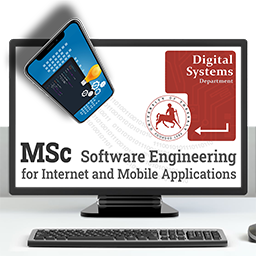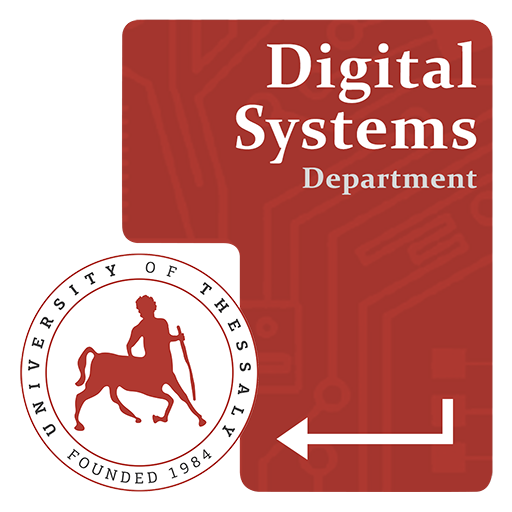General Information
The Postgraduate Studies Program (MSc) entitled “Software Engineering for Internet and Mobile Applications” operating in Larissa since October 2021. The MSc is organized by the Digital Systems Department of the School of Technology (University of Thessaly) under the provisions of the relevant legislation. Its establishment has been approved according to Government Gazette 2625 B’/18-06-2021, updated with Government Gazette 3791 B’/12-06-2023, while it also follows the provisions on scholarships and free attendance of Law 3387B/10-8-2018.
Infrastructure
The Postgraduate Program will operate at the University of Thessaly – Gaiopolis Complex / Larissa, in the facilities of the Department of Digital Systems. The Department has four (4) lecture halls, one (1) auditorium, and eight (8) computer laboratories. All facilities are air-conditioned.
Some courses of the MSc Program also include laboratory sessions, some of which involve the usage of special equipment (Arduino, Distributed Systems, etc.). In particular, from the Academic Year 2024-2025, all laboratory exercises will be able to be followed remotely.
In addition to the departments of the School of Technology, the Gaiopolis complex also houses the departments of the School of Agricultural Sciences and the School of Economics & Administrative Sciences. The complex has ceremonial amphitheaters, a modern Library, an organized conference center, and a student restaurant. Within the campus, a student dormitory complex exists, and students have access to rich sports facilities that include an indoor gym with stands, muscle-strengthening equipment, a clinic, dance, and martial arts halls, as well as outdoor football, basketball, volleyball, and tennis courts. In 2023, the sports facilities underwent an extensive upgrade through the Region of Thessaly.
Admissions – Selection Process – Tuition Fees
All applicants must hold an undergraduate degree from any of the following university departments in Greece, Cyprus, or any other academically recognized institution based abroad.
- CS/IT/Informatics Departments,
- Science Departments (Physics, Mathematics, etc.),
- Polytechnic Departments and equivalent departments abroad whose subject matter is related to the subject matter of the MSc,
- Graduates of any other departments relevant to the subject of the MSc, which are assessed on a case-by-case basis by the competent Postgraduate Student Selection Committee.
The initial selection of applicants is based on a score (on a scale of 1-100) resulting from the following criteria:
- Performance in undergraduate studies related to the subject of the MSc (30%),
- Relevance of the Thesis to the objectives of the MSc (15%),
- Available Professional Experience, relevant to the MSc (10%),
- Scientific & Research work, such as postgraduate degrees, scientific papers in reputable scientific journals or conference proceedings, relevant to the MSc (15%),
- Level of English language knowledge (10%),
- Participation in European exchange programs (5%),
- Computer knowledge (5%),
- Letters of Recommendation (total) (5%), and
- Additional qualifications (seminars, studies, etc.) (5%)
A maximum of 45 students are selected based on their grades. The final selection is made after a personal interview. The number of admissions per year to the program is set at a maximum of thirty (30) postgraduate students.
Tuition fees are set at €2200 and are paid in installments as follows: €200 within 10 days of the student’s acceptance into the postgraduate program, €600 at the beginning of the first semester, €800 at the beginning of the second semester and €600 at the beginning of the third semester. A different arrangement for payment of tuition fees is possible, upon request of the student.
Duration of Study – Language
The Postgraduate Diploma Programme can be full-time or part-time. In the case of full-time study, the minimum duration for the award of the Postgraduate Diploma Programme is set at three (3) semesters of study, of which the third is allocated for the preparation and examination of the postgraduate diploma thesis. The completion of the studies of Postgraduate students cannot exceed the normal duration of studies plus two additional semesters. For serious reasons – health, family or professional – Postgraduate students may request a temporary interruption of their studies for one or two semesters of study. In the case of part-time study, the above periods are doubled as the semester course load is halved (see also Part-time Study Programme).
The language of instruction for the courses is Greek, provided that all students enrolled speak Greek, otherwise the courses will be taught in English. In the case of instruction in English, assignments may be done in Greek or English, and the topics of Assignments and Exams will be given in both languages.
Study Program – Exams
Each semester of study lasts thirteen (13) weeks and includes the same number of lectures. The courses of the MSc require the physical presence of students. For the convenience of the participants, the courses are held on Tuesdays and Thursdays in the afternoons (usually 17:00-21:00), while there is the possibility of additional adjustment in terms of days (e.g. and Wednesday), if this serves the participants. Each main teaching day (Tuesday or Thursday) concerns two of the courses of the curriculum.
For those students who are unable to attend the courses in person, the possibility of remote synchronous monitoring is provided, through the MS-Teams platform of the University.
In each semester, the student is required to attend four out of the five available modules. During the third semester, the student must prepare and defend his/her dissertation. Each module corresponds to 7.5 credits (ECTS) while the postgraduate thesis corresponds to 30 ECTS. Thus, the workload of each semester corresponds to 30 ECTS, while a total of 90 credit units is required to obtain the MSc.
The examination of the semester’s modules is held at the end of each semester, and it typically occurs in February and June. Re-examination of all modules will be conducted (if required) after the completion of both academic semesters, on dates to be announced in due course (typically in September).
More information about full-time study is available at https://seima.ds.uth.gr/modules-full-en/, while for part-time study at https://seima.ds.uth.gr/modules-partial-en/.
Faculty – Teaching Staff
The following categories of teaching and faculty staff are eligible to undertake the teaching of the courses of the MSc:
- faculty members (teaching and research staff), special educational staff members, laboratory teaching staff, and special technical laboratory staff of the Digital Systems Department*,
- faculty members of other higher educational institutions or higher educational military academies*,
- emeritus professors or any other retired faculty and/or teaching staff members of the Digital Systems Dep. or other departments of the same or other universities,
- associate and assistant professors,
- visiting professors or researchers,
- researchers and/or specialist scientists who are members of the research and technological bodies/centers/institutions under article 13A of Constitutional Law 4310/2014 (section A 258) or of other national or foreign research centers and/or institutions,
- scientists of recognized academic status and achievement, who can contribute to the MSc’s objectives through their specialized knowledge, expertise, and relevant experience in the field of ICT and scientific research.
More information about the instructors is given at: https://seima.ds.uth.gr/en/teaching-staff-en/
* who are legally entitled to undertake further employment above their standard teaching obligations




